PRESCRIPTION DRUG ABUSE

Prescription drug abuse is a uniquely American problem that is not limited to geography or demographic. Our country accounts for less than five percent of the world’s population but consumes over 80 percent of the world’s opioids and 99 percent of its hydrocodone. That translates into 46 people a day dying from a prescription drug overdose.
In Massachusetts, nearly 2 people a day are dying of opiate overdoses, and two counties in our district – Bristol and Barnstable – have the highest per capita overdose rates in the Commonwealth, respectively.
Since coming to Congress, Bill has been calling for an across-the-board policy on the use of abuse-deterrent technologies in prescription painkillers. Abuse-deterrent technology is a critical component in prevention that includes both physical barriers to prevent misuse, like crush-resistance and increased heat tolerance, and pharmacological barriers to bring down the potency of these drugs when too much is consumed.
That is why Bill authored the Stop the Tampering of Prescription Pills (STOPP) Act, which is first-of-its-kind federal legislation requiring the use of abuse-deterrent technologies in prescription painkillers. This bipartisan legislation directs pharmaceutical manufacturers to invest in research and production to formulate abuse deterrent drugs in order to compete with drugs of a similar nature that already employ abuse deterrent technologies.
He is a member of the Congressional Addiction, Treatment, and Recovery Caucus; Rx Drug Abuse Caucus; and the Youth Drug Prevention Caucus. These organizations work a multi-pronged approach to battle drug addiction on the federal level. He has also been a keynote speaker for the past three years at the National Drug Abuse Summit in Atlanta.
Bill believes it is imperative that we stem the rising rates of addiction by investing directly in communities so that they may target and address the rising epidemic. This includes funding to further expand prescription drug monitoring programs (PDMPs) in every state, as well as funding for the Substance Abuse and Mental Health Administration (SAMSHA), which supports community and faith-based initiatives, along with grants to encourage Drug-Free Communities (DFC) and school zones. Furthermore, increased funding for High Intensity Drug Trafficking Areas (HIDTA) would allow coordination between federal, state and local drug task forces to disrupt or dismantle drug trafficking organizations in HIDTA identified counties.
Addressing the prescription drug abuse epidemic is not only a public health priority, but an economic concern as well. The societal costs associated with prescription drug abuse are debilitating. In addition to disrupting the health and well-being of individuals, families, and communities, the collective cost of prescription drug abuse is estimated to surpass $55 billion annually. As a former District Attorney, Bill has witnessed the power of a multi-pronged approach to addressing prescription drug abuse. There is no one solution to fighting this epidemic but we benefit from the inclusion of patients, educators, law enforcement and government officials, prescribers, community, and faith-based leaders.
Bill believes it is important that community leaders are engaged in the larger fight against abuse and addiction. For this reason, he has begun organizing faith based group roundtables with participants who are active within their communities. He has already held three in the district with great success.